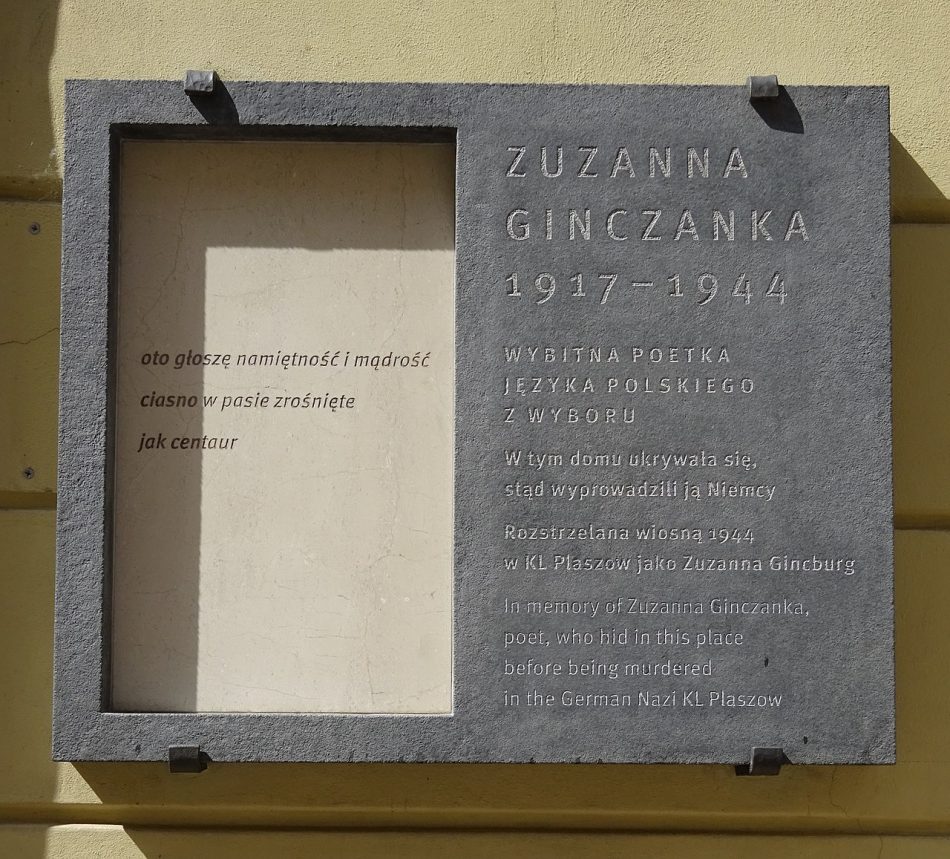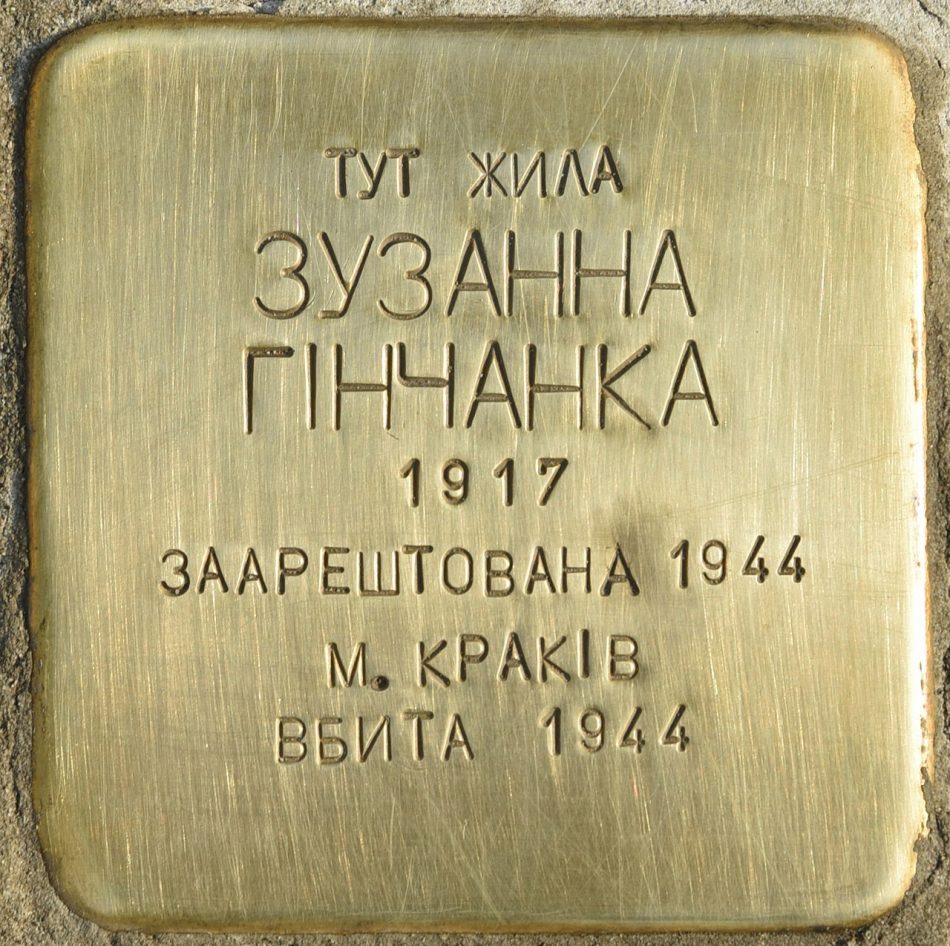Vid Zuzannas port igen
Category: antisemitism, by sophie engström, Centraleuropa, Galizien, Historia, Jews, Kåseri, krönika, literature, poetry, poland, ukraina
Tags: Dagens Nyheter, Förintelsen, judisk historia i Galizien, judiska Lviv, Kraków, Lviv, Minnesplakett, Peter Wolodarski, Polen, Rivne, Stanisław Lem, Zuzanna Ginczanka
Nå, det finns kanske de av er som tror att min kärlek till dem som tidigare befolkade Lvivs gator, då staden hette Lwów eller Lemberg, betyder att jag inte känner någon kärlek till dem som befolkar staden idag. Det är faktiskt en helt felaktig slutsats. Ty mitt hjärta klappar lika starkt för dem som bodde här tidigare, och dem som är här nu.
Men det är ändå så att det är minnet som intresserar mig. Hur vi minns och vilka vi minns. Och jag är särskilt intresserad av dem som inte syns. De som glömts, och således finns gömda bakom fasaderna. De, vars själar, ännu ändå på något vis finns här.
Och jag är inte ensam om att känna denna nyfikenhet. Denna iver att gräva fram alla de berättelser som döljs för den omedvetna lvivivanen eller den tillfällige besökaren.
Jag skulle nu kunna sammanställa en lång lista över alla de grupper, organisationer och personer som drivs av samma kall som jag. Men jag har lärt mig den hårda vägen att allt jag skriver här är utrustat med vingar av dun (för att parafrasera Zuzanna Ginczanka) som lätt svingar iväg och hamnar hos någon annan mer etablerad, som liksom av en händelse glömmer att nämna mitt namn. Därför sitter jag på en hel uppsjö av kunskaper, som inte delas här. Dessa kunskaper får helt sonika får nöja sig med att vandra tillsammans med mig, tills det att jag beslutat vad jag ska göra med dem.
Men låt oss återgå till minnet. Var än jag går finner jag det. Inte behöver det finnas någon speciell person knuten till varje plats för att man ska känna vilka som varit där, vad de tyckte om, och det är nästan så att jag ibland kan ta på deras drömmar och förhoppningar. Ett vant öga kan se det där. Se dem. Kanske är det lite lättare för mig än för många som är födda och uppvuxna i lejonstaden. Jag kommer liksom fri från sentimentalitet. Fri från egna minnen. Men med en hel skottkärra (eller rullebör, som jag hellre kallar den) av omättlig nyfikenhet, lust att förkovra mig och… det viktigaste… ödmjukhet. Ty jag känner både ödmjukhet för dem jag träffar och som bor här nu, och inför minnet av dem som bodde här tidigare. De är för mig ändå ett och samma. Förbundna genom denna förtrollade plats.
Jag ska inte sticka under stol med att jag ibland misstycker med hur man förvaltar historien här. Trots att det finns många som intresserar sig för att bära historien vidare, så finns det tyvärr de som inte tycks bekymra sig märkbart om den. Det senare förhållningssättet bygger nästan uteslutande på avsaknad av kunskap eller bristande ekonomi. De som medvetet demolerar är en liten grupp som bara har pengar för ögonen. Och de är ofta redan rika och befinner sig i ett ekonomiskt skugglandskap, som i och med kampen mot korruptionen, ändå lever på lånad tid och är förhållandevis snart ett minne blott.
Det finns ändå vissa platser i staden som jag skulle önska att de som bodde där förr blev synliga för de som bor här nu. Zuzanna Ginczanka är en sådan person. En plakett utanför porten där hon bodde skulle antagligen bara väcka förtjusning och nyfikenhet. Ett annat exempel är Stanisław Lem. Han hade en plakett, men den togs ner av husägarna. En plakett över honom skulle antagligen också bidra till förtjusning hos inte bara dagens lvivianer, utan även hos alla de polska turister, som dagarna i ända vandrar runt i Lviv och söker Stanisław.
Idag vill jag dock främst slå ett slag för Zuzanna Ginczanka. Ty här finns en svensk koppling. DNs chefredaktör Peter Wolodarskis mormor var nämligen god vän till Zuzanna. Hon hette Lusia Stauber och gick ur tiden förra året. Sverige har alltså en koppling till Zuzanna Ginczanka, och till dagens Lviv. Vi har ju givetvis många andra kopplingar, men visst är det lite kittlande att få känna samhörighet med en av Polens mest kända poeter? En poet som dessutom är på modet just nu. Dessutom skulle vi vara med och berika Lvivs nutid, något som alla här älskar. Och varför ska Lviv vara sämre än Kraków och Rivne? De har satt upp plaketter. Zuzanna bodde ändå tre år i samma hus i Lviv.
De av er som orkat harva er ner genom min oändliga textmassa (den blev ju lite längre än en tweet), kanske undrar om det finns någon slags uppmaning i min text. Ja, låt så vara, det kanske finns det. Om ni känner er kallade, skriv en rad till mig. Kanske faller det du skriver mig i smaken.
(Här kan du läsa tidigare inlägg på temat Zuzanna Ginczanka. Skrolla nedåt, eftersom detta blogginlägg ligger först.)

Minnesplakett på huset i Kraków där Zuzanna bodde sin sista tid i livet.

En minnesplakett på huset i Rivne, där Zuzanna bodde med sin mormor.
Bilder från Wikipedia.

